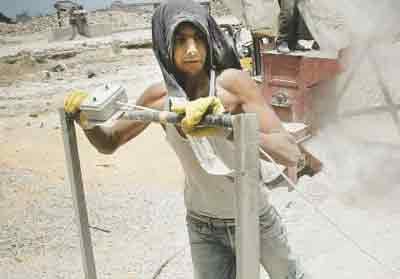Silicosis: an occupational lung disease

Silicosis is an uncommon disease in our country. But it has been reported recently that over the last few months eighteen people have died and more then hundreds have been suffering from silicosis in Patgram Upazila, Lalmonirhat. These affected people are engaged for breaking stones for years together. Because of continuous inhalation of silica particle in their work environment, they became ill.
Silica is the second most common mineral in the earth's crust and is a major component of sand, rock and mineral ores. Over-exposure to dust that contains microscopic particles of crystalline silica can cause scar tissue to form in the lungs, which reduces the lung's ability to extract oxygen from the air we breathe. Typical sand found at the beach does not pose a silicosis threat.
Working in any dusty environment where crystalline silica is present potentially can increase your chances of getting silicosis. Industries and activities that pose the greatest potential risk for worker exposure: construction (sandblasting, rock drilling), mining, ceramics, clay and pottery, stone cutting, glass manufacturing, shipyards etc.
If a number of people are working in a dusty environment and one is diagnosed with silicosis, others should be examined to see if they are also developing silicosis.
To develop silicosis, usually a long exposure is needed. Initially there is fever, cough, shortness of breath, weight loss, respiratory insufficiency, heart failure and finally death, unless measures are taken earlier. It may often produce chronic cough like symptoms, may often confused with TB even.
Unfortunately silicosis has no effective medical treatment except lung transplantation that is not an available option in Bangladesh. So prevention is the only measure that can save these poor workers.
Spraying water on the stones prior to breaking or grinding and use of proper fitting effective mask may minimise the risk of silica inhalation. You should not eat, drink or use tobacco near highly dusty areas.
After exposure to dust, wash your hands before eating, drinking. Take advantage of health screening if offered by your employer. Industrial hygiene needs to be followed strictly.

 For all latest news, follow The Daily Star's Google News channel.
For all latest news, follow The Daily Star's Google News channel. 



Comments